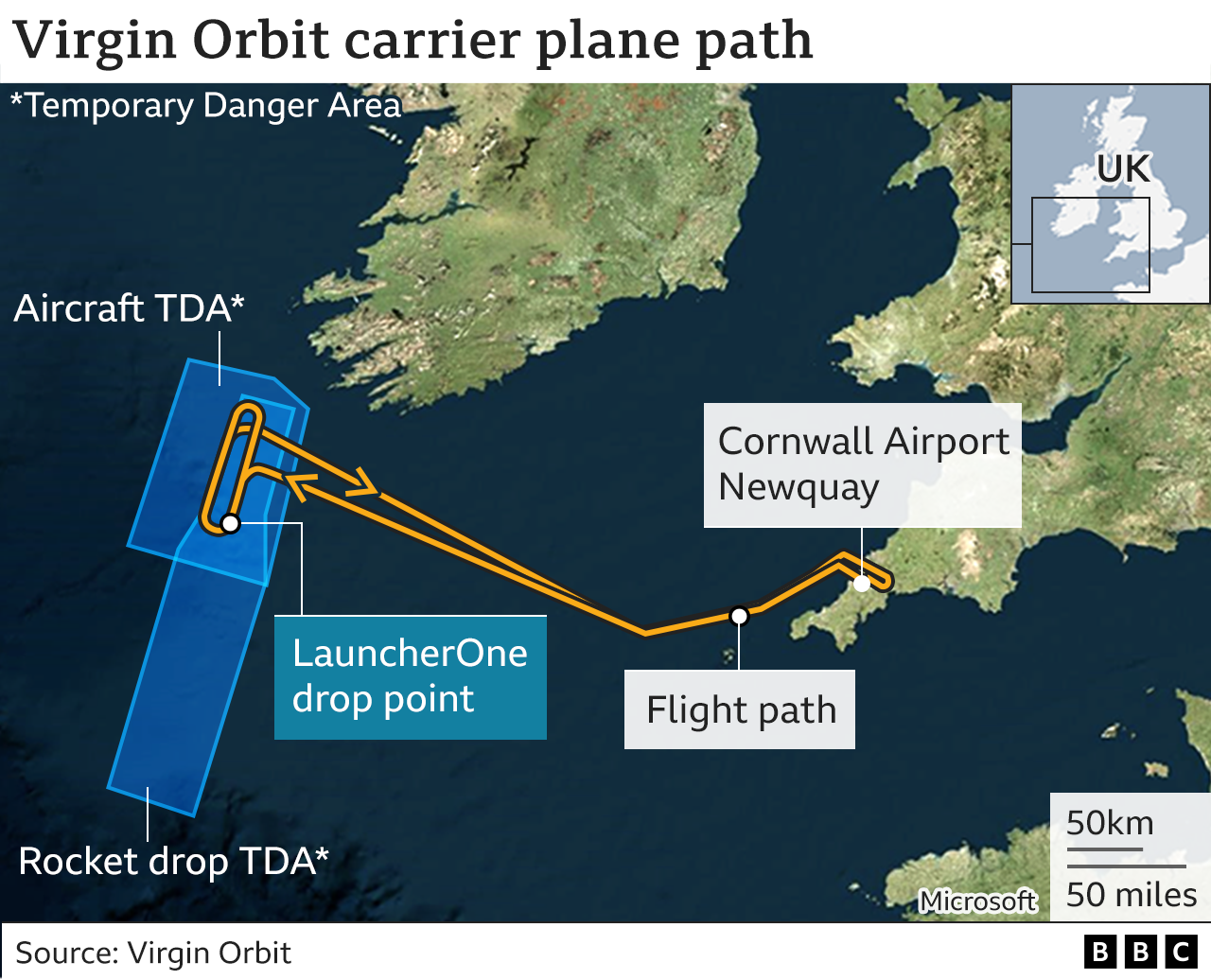Cornwall space launch: Virgin Orbit targets Monday for UK mission
BBC NewsSaturday 7th January 2023

Cosmic Girl will carry the rocket out over the ocean, attached to the underside of the left wing

By Jonathan Amos
BBC Science Correspondent
@BBCAmos
The first ever orbital space launch from the UK is back on and scheduled for the night of Monday 9 January.
The Virgin Orbit company says it's now ready to proceed with the historic mission, which will be run out of Cornwall Airport Newquay.
It will see a repurposed 747 release a rocket over the Atlantic to take nine satellites high above the Earth.
Virgin stood down an attempt before Christmas for late additional testing, but the firm says it's now good to go.
Its jumbo jet, nicknamed Cosmic Girl, together with the booster, known as LauncherOne, came through a "wet dress rehearsal" this week - a practice run at getting both vehicles fuelled and ready to make the charge down Newquay's runway.
"After ensuring that every technical aspect is sound and every regulation and code has been satisfied, it is gratifying to see this historic endeavour on the verge of coming to fruition," said Dan Hart, the CEO of Virgin Orbit.
"This launch represents the opening of a new era in the British space industry and new partnerships across industry, government, and allies."

Rockets have been sent to space from the UK before, but not to put satellites in orbit. Those earlier efforts were part of military exercises or for atmospheric research and the vehicles involved came straight back down.
The payloads to be lofted by Virgin's LauncherOne rocket will stay up, circling the Earth, when they're dropped off at an altitude of 555km.
Monday's event is being billed as a breakthrough moment for the UK space sector.
Internationally renowned for making satellites of all sizes, the country's space industry has always had to send its products to foreign spaceports to get them into orbit.
Adding a launch capability means the sector will in future be able to do everything from first design through to mission operations.
This means cost and time savings for British firms but the hope is the final piece of the jigsaw will also make the UK a more attractive place for other nation's companies to invest.

The nine satellites on board will pursue a range of applications
"For us, it's about capitalising on the cannibalistic effect that launch has of attracting other businesses, either in a supply chain capacity, or because companies 'just want to be part of it'," said Melissa Thorpe, the head of Spaceport Cornwall.
"We're seeing that already. We have a building on site that's opening in March that's going to have R&D and workspace in it. It's full already, even though we haven't opened it yet," she told Thursday's Inside Science programme on BBC Radio 4.
Monday's mission opportunity has been purchased by the US National Reconnaissance Office and is being used to advance a number of satellite technologies of security and defence interest to both the American and British governments. But there are also civil applications being taken up on the flight - and a number of firsts, such as the first satellite built in Wales and the first satellite for the Sultanate of Oman.
The UK's Civil Aviation Authority, which regulates commercial spaceflight in the UK, said on Thursday that all nine spacecraft on the manifest had now been licensed. Virgin and Spaceport Cornwall received their launch licences before Christmas.

Cosmic Girl, with LauncherOne slung beneath her left wing, is expected to leave Newquay sometime after 22:16 GMT.
The plane will head west to a designated launch zone just off the coast of the Irish counties of Kerry and Cork.
At the appropriate moment, likely just after midnight, and at an altitude of 35,000ft, the 747 will release the rocket, which will then ignite its first-stage engine to begin the climb to orbit.
The southward trajectory of the rocket has required the co-operation of Spanish and Portuguese authorities, as well as the Irish government.
Virgin Orbit, which was founded by British entrepreneur Sir Richard Branson, is banking on a good, clean mission on Monday so that it can turn its attention to the backlog of satellites it has that require rides.
The company only managed to launch twice in 2022. The Long Beach, California-based venture needs to increase the number of launches significantly in 2023 to meet its commercial and financial objectives.

Cornwall space launch: Virgin Orbit targets Monday for UK mission
The first ever satellite mission from British soil is expected to run out of Newquay next week.
www.bbc.co.uk










